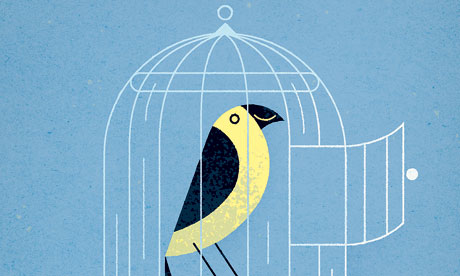
Back in February, when Yahoo's chief executive, Marissa Mayer, announced a company-wide ban on working from home, the response from media commentators was vociferous. (If the outcry seemed disproportionate, perhaps that's because so many of them work from home and didn't want their editors getting ideas.)
Mayer's detractors say the ban is anti-family and anti-feminist; her supporters argue that working face-to-face brings benefits that email and phone calls can't rival. Both sides have a point, but the real reason I suspect the policy will prove wrong-headed is more elemental. Deep down, people crave few things so desperately as a feeling of autonomy, and at Yahoo that just got squelched – not just among telecommuters but also among those employees who would never actually have chosen to work from home anyway.
It's a cliché that more choice isn't always a good thing: people get less pleasure from whatever they end up choosing, and may make riskier decisions, too. Yet the idea of keeping one's options open exerts an extraordinary power – as demonstrated again, most recently, by research in the field of "compliance-gaining techniques". One of the most reliable ways of persuading someone to do what you want, it turns out, is simply to add a phrase such as, "But you're free to choose" or, "But obviously, don't feel obliged."
A review of 42 studies, conducted among 23,000 people in France, Russia and elsewhere, found that reminding people of their autonomy made it much more likely they'd agree to a request such as donating to charity, signing a petition or paying a stranger's bus fare. (I found the research via PsyBlog at spring.org.uk.) In one experiment, in a French shopping mall, only 10% of people gave to charity when asked – but when researchers added, "You are free to accept or refuse", the proportion shot up to 47.5%.
What's especially unsettling about this isn't the simple fact that we like to be reminded we've got options. Instead, it's the implication that this freedom is being granted by the person seeking our compliance. Confronted by a chugger in the street, you're obviously always "free to choose", whether or not he or she happens to mention it. The findings seem to suggest, however, that we give our accoster the authority to give or withdraw that autonomy – which makes you wonder if it's really autonomy at all. It's uncomfortably reminiscent of the "closed choice" technique for gaining compliance from toddlers: "Would you like to wear the green jumper, or the red jumper? You get to choose!"
There are also echoes of the "reciprocity rule", the urge that famously explains, among other things, why the Hare Krishnas hand out flowers or books before asking for cash, and why giving people mints with their restaurant bill can boost tips by almost a quarter. Indeed, one theory is that reciprocity is why "But you are free" works so well: having received the "gift" of being allowed to say no, you feel obliged to repay the favour – by saying yes.
It's arguably heartwarming that we behave like this, of course. The problem is how easily it's exploited.
By the way: the way to evade chuggers, I've finally learned, is not to get rattled by trying to think of the right thing to say, but just to focus on not breaking your pace. Works like magic. Try it! I mean, if you like. No pressure. You're free to – well, you get the point.
oliver.burkeman@theguardian.com
• Follow Oliver on Twitter

